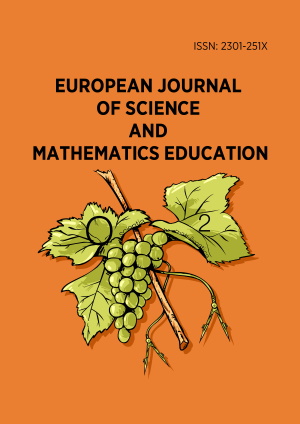Research Article
A study on the algebraic working processes of senior high school students in Ghana
More Detail
1 Mathematics Education, University of Education, Winneba, Ghana* Corresponding Author
European Journal of Science and Mathematics Education, 6(2), April 2018, 62-68, https://doi.org/10.30935/scimath/9523
OPEN ACCESS 3112 Views 1685 Downloads
ABSTRACT
The aim of this study was to examine the working processes employed by Ghanaian senior high school students when dealing with tiling pool problem algebraically. The study employed survey design, with a total sample of 304 Senior High School Form 1 students from three Senior High Schools in the Central Region of Ghana. Data were collected through Super Item test based on Structure of the Observed Learning Outcome (SOLO) taxonomy. Qualitative data were coded and analysed into themes. The results showed that most of the students surveyed were unfamiliar with the tiling pool problem and could not find a link between the algebraic concepts learnt and non-routine problems. It is recommended that high school teachers should consider students’ working processes as integral part of their instructions and assessments.
CITATION (APA)
Apawu, J., Owusu-Ansah, N. A., & Akayuure, P. (2018). A study on the algebraic working processes of senior high school students in Ghana. European Journal of Science and Mathematics Education, 6(2), 62-68. https://doi.org/10.30935/scimath/9523
REFERENCES
- Anamuah-Mensah, J., Mereku, D. K., & Ghartey-Ampiah, J. (2008). Ghanaian Junior Secondary School Students’ Achievement in Mathematics and Science: Results from Ghana’s participation in the 2007 Trends in International Mathematics and Science Study. Accra: Ministry of Education Youth and Sports.
- Collis, K. F., Romberg, T. A. & Jurdak, M. E. (1986). A Technique for Assessing Mathematical Problem-Solving Ability. Journal for Research in Mathematics Education, 17(3), 206-221.
- Creswell, J. W. (2009). Research Design. Qualitative, Quantitative, and Mixed Methods Approaches. 3rd ed., Thousand Oaks: CA. Sage.
- Fletcher, J. A. (2008). Developing Algebraic Thinking Through Group Discussion Mathematics Connection, 7(3), 25-34.
- Kaput, J. (2008). What is Algebra? What is Algebraic reasoning? In J. J. Kaput, D. W. Carraher& M. L. Blanton (Eds.), Algebra in the early grades (pp. 235-272). New York: Lawrence Erlbaum Associates.
- Kriegler, S. (2008). Just What is Algebraic Thinking? http://www.math.ucla.edu/kriegler/pub/Algebrat.html (Accessed 2011)
- Kvale, S., & Brinkman, S. (2009). Interviews. Learning the Craft of Qualitative Research Interviewing. (2nd ed) London: SAGE Publication, Inc.
- Lam, P., & Fong, Y. Y. (1998). Assessment of Mathematics Structure of Learning Outcome Proficiency Attainment Level using Hierarchical items in Testlets. Educational Research Quarterly, 27(2), 3-15.
- Lim, L. H., & Idris, N. (2006). Assessing Algebraic Solving Ability of Form Four Students. International Electronic Journal of Mathematics Education, 1(1), 55-73.
- Lim, L. H., Wun, Y. T., & Idris, N. (2005a). Superitem Test: An Alternative Assessment Tool to Assess Students’ Algebraic Solving Ability. School of Educational Studies. Universiti Sains Malaysia 11800 Minden, Pulau Pinang Malaysia.
- Lim, L. H., Wun, Y. T., Idris, N., & Meng, C. C. (2005b). Assessing a Hierarchy of Pre- Service Teachers’ Algebraic Thinking of Equation. www.recsam.edu.my (September 2011)
- Mereku, D. K., & Cofie, P. K (2008). Overcoming Language Difficulties in Solving Mathematics Problems in Basic Schools in Ghana. Mathematics Connection, 7(7), 77-89.
- Mereku, D. K. (2004). Mathematics Curriculum: Implementation In Ghana. Danjoe Production: Accra, Ghana.
- Ministry of Education (MOE). (2012). Teaching Syllabus for Mathematics in Ghana. Accra,Ghana: Ministry of Education.
- Owusu-Ansah N. A., Cofie P. O. & Asiedu Adoo S. A. (2015). Classifying the Algebraic Thinking Levels of Ghanaian Junior High School Students in Mathematics using SOLO Taxonomy. Journal of Science Education and Research 1(5), 49-56.
- UNICEF (2007). East Asia Learning Achievement Study. Keen Media, Thailand.
- Wilson, M., & Iventosh, L. (1988). Using the Partial Credit Model to Investigate Responses to Structured Subtest. Applied Measurement in Education, 1(4), 319-334.
- Windsor, W. (2010). Shaping the Future of Mathematics Education: Proceedings of the 33rd annual conference of the Mathematics Education Research Group of Australasia. Fremantle: MERGA L. Sparrow, B. Kissane, & C. Hurst (Eds.)


 The articles published in this journal are licensed under the CC-BY Creative Commons Attribution International License.
The articles published in this journal are licensed under the CC-BY Creative Commons Attribution International License.